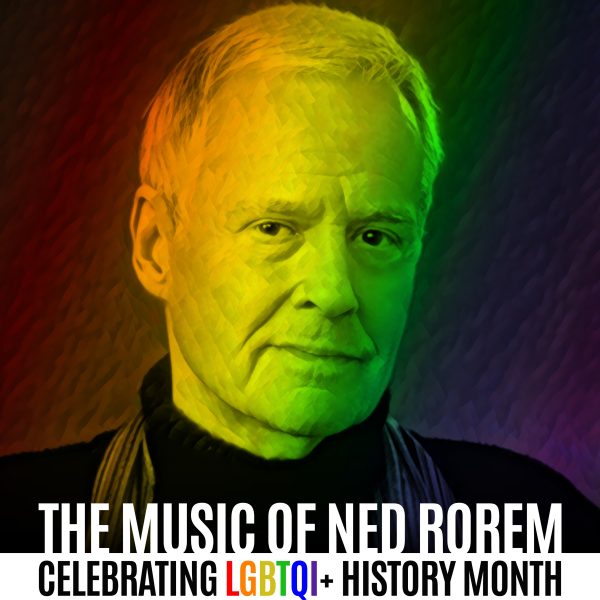
As a kickoff for LGBTQI+ History Month, the Blair School of Music faculty will present a concert of works written by and for composer and author Ned Rorem, Tuesday, October 3, 8:00 p.m., in Turner Recital Hall.
Known for both his breadth of output for both vocal and instrumental forces, Rorem entered gay icon status through the publication of his diaries over forty years, beginning in 1966. In addition to a selection of works by Rorem, a new work by Blair composer Russell Platt—writing in honor of Rorem—will be performed.
This concert was conceived first as a 100th birthday celebration for the composer (who was born October 23, 1923), but Rorem passed away in 2022, shortly after his 99th birthday.
Amy Jarman and Dashon Burton will be joined by Jennifer McGuire in selections of Rorem’s works for voice and piano, while the instrumental faculty will tackle Rorem’s 12-movement “Winter Pages” for clarinet, bassoon, violin, cello, and piano, written for the Chamber Music Society of Lincoln Center. Peter Kolkay will also introduce to Nashville a work for solo bassoon written in honor of Rorem by Blair faculty member Russell Platt, who was a student and friend of the late composer.
Featuring Blair faculty members Amy Jarman, soprano; Dashon Burton, bass-baritone; Mariam Adam, clarinet; Peter Kolkay, bassoon; Amy Dorfman, piano; Jennifer McGuire, piano; Carolyn Huebl, violin; and Felix Wang, cello.
Peter Kolkay shares his thoughts on Ned Rorem’s music and impact on the LGBTQ+ community:
I first encountered Ned Rorem’s name in high school while reading about what we then called “modern music” (basically, anything after “The Rite of Spring”). I was particularly interested in Samuel Barber, and Rorem’s name was always mentioned alongside Barber’s as the major composers of art song in America. But my first encounter with Rorem’s music wasn’t until college, when I ran across an album that contained his “Winter Pages” (the work we’re playing on Tuesday evening). I think what probably caught my eye was the fact that the piece had a bassoon part, and I was always looking for new repertoire—and a piece this substantial definitely piqued my interest.
Rorem was a gay icon in spite of himself I think. His first two diaries, published when he was in his early 40s (The Paris Diaries in 1966 and The New York Diaries in 1967), made it unapologetically clear that Rorem was gay; what was eye-opening (at least to me) was that so many of the artists, composers, writers, and musicians mentioned therein were also gay, or at least at home around gay people. Back at the time—unlike today– most gay composers lived in the closet: Barber, Bernstein, Copland, Menotti. Rorem’s music itself never had overtly LBGTQI+ related programmatic content, but his life was shot through with it. But Rorem never claimed to be a LGBTQ+ icon: one of his most famous statements was “I’m not a gay activist. I didn’t come out of the closet…because I was political, it was because I was too lazy to pretend I was something that I wasn’t.”
This idea for this concert started out as a 100th birthday celebration for the composer, who would have been 100 on October 23, 2023. Rorem died shortly after his 99th birthday, but the idea had already been planted in my mind and solidified after an experience I had while coaching the Vanderbilt Orchestra’s wind section on John Corigliano’s Symphony No. 1. That particular work, subtitled “Of Rage and Remembrance,” is a direct response to the AIDS epidemic of the 1980 that took so many of Corigliano’s friends and collaborators. When I explained to the students that in the 1980s an AIDS diagnosis was a painful death sentence, and that the stigma around the disease was so great that those dying were often abandoned, some of them sat upright: I don’t think they had any idea of the reality of those dark times. So planning a concert of Rorem’s works in October 2023 became not only a memorial for the composers, but also a chance to offer some celebration of the life and music of those members of the LGBTQ+ community who were active before the idea of such a community even existed.
Russell Platt shares his personal recollections and the inspiration for his new work, Sunday Variations for unaccompanied bassoon, written in Ned Rorem’s honor:
I studied composition with Ned Rorem at the Curtis Institute of Music in 1987 and ’88, and it was unquestionably the most important year of my musical life. Ned’s life was not a direct model for mine, but his courage as a gay man, his versatility as both composer and prose stylist, and, most importantly, the brilliance and clarity with which he crafted his proudly tonal music were a towering inspiration.
Ned’s music was both beautiful and interesting, qualities which I have striven for in my own music over the decades. And while Ned was of course most renowned for his songs, he was also the creator of a body of music for instruments—including “Winter Pages”—which should be much better known.
So, when the Curtis Institute asked me, along with other alumni composers, to compose a solo piece in honor of its upcoming centenary, I naturally chose to write for bassoon, and to pay tribute to my favorite among Ned’s non-vocal pieces: “Sunday Morning,” a vivid, virtuosic piece for large orchestra inspired by the words of the Wallace Stevens poem. The piece you’ll hear is a set of twenty-one variations on the bright and forthright ten-note motive from the first movement of Ned’s masterpiece. While the piece is dedicated to another Curtis alumnus, the Milwaukee Symphony’s principal bassoon, Catherine Van Handel, I’m grateful that Peter will be performing it here.